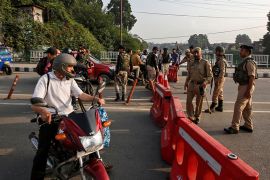Two years after the revocation of Kashmir’s special status, India is still working to silence Kashmiris.
![An Indian paramilitary soldier stands alert in his bunker on a road, on March 15, 2021 in Srinagar, Indian-administered Kashmir, India. [Yawar Nazir/Getty Images]](https://www.aljazeera.com/wp-content/uploads/2021/08/GettyImages-1231728213-1.jpg?resize=270%2C180&quality=80)

Ather Zia is a poet and a political anthropologist who teaches Anthropology and Gender Studies at University of Northern Colorado Greeley. She is the ... author of Resisting Disappearance: Military Occupation and Women's activism in Kashmir. She is founder editor of Kashmir Lit and co-founder of Critical Kashmir Studies.
Two years after the revocation of Kashmir’s special status, India is still working to silence Kashmiris.
![An Indian paramilitary soldier stands alert in his bunker on a road, on March 15, 2021 in Srinagar, Indian-administered Kashmir, India. [Yawar Nazir/Getty Images]](https://www.aljazeera.com/wp-content/uploads/2021/08/GettyImages-1231728213-1.jpg?resize=270%2C180&quality=80)
The revoking of Article 370 is just the latest step in the BJP’s grand plan to transform India into a Hindu-only nation.

As the militarisation of Kashmir has grown, so have victimisation and radicalisation.

The Indian government is using the veneer of gender justice and anti-discrimination to change Kashmir’s status.

Why Kashmir’s millennials have stones in their hands.
